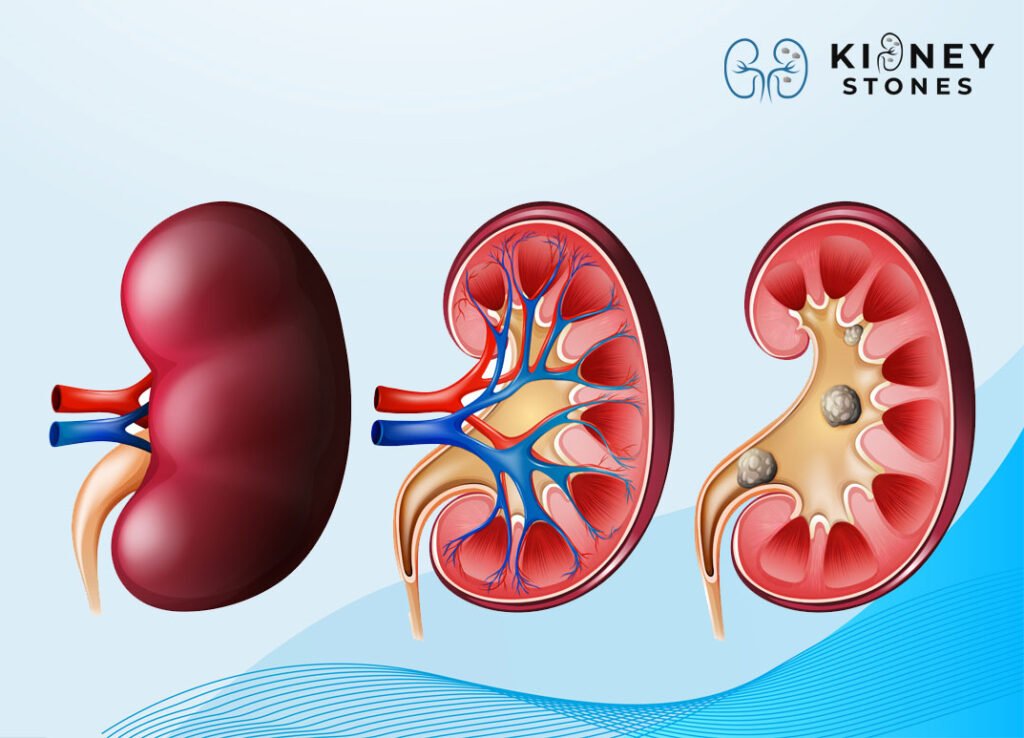Causes of Kidney Stones - Overview
Discover the common causes of kidney stones, including dehydration, diet, and underlying health conditions. For expert diagnosis and treatment, consult Dr. Jayanth Reddy, the best kidney stone specialist in Hyderabad.

Causes of Kidney Stones

Dehydration and Its Role in Kidney Stone Formation
- The Importance of Staying Hydrated: When the body doesn’t have enough water, the urine becomes more concentrated, which means there are more minerals and salts present. This increases the chances of these substances crystallizing and forming stones.
- How Low Water Intake Leads to Concentrated Urine: Dehydration is one of the leading causes of kidney stones. Without enough water to dilute urine, substances like calcium, oxalate, and uric acid can crystallize in the kidneys and form stones.
- Location of Pain: Pain typically starts in the side or back, below the ribs, and may radiate to the lower abdomen and groin.
- Intensity of Pain: The pain can be excruciating and may come in waves, fluctuating in intensity as the stone moves.
Dietary Factors Contributing to Kidney Stones
- The Impact of Oxalate-Rich Foods: Certain foods, such as spinach, nuts, chocolate, and beets, are high in oxalates, which can bind with calcium in the urine and form calcium oxalate stones. Consuming large amounts of these foods can increase the risk of kidney stones.
- Excessive Salt and its Effect on Kidney Health: High sodium intake causes the kidneys to excrete more calcium, which can lead to the formation of kidney stones. Reducing salt in the diet can help prevent calcium stones.
- How High Protein Diets Influence Stone Formation: Diets rich in animal proteins (like red meat, eggs, and fish) can raise the levels of uric acid in the body, leading to the development of uric acid stones. A high-protein diet can also reduce the amount of citrate in urine, which normally helps prevent stone formation.
- The Relationship Between Calcium Intake and Stones: While dietary calcium is important for bone health, excessive calcium intake from supplements (rather than food) can increase the risk of forming calcium-based kidney stones. However, calcium from food is generally not a risk factor for stone formation.
Medical Conditions That Increase the Risk of Kidney Stones
- Hyperparathyroidism and Increased Calcium Levels: Hyperparathyroidism is a condition where the parathyroid glands produce too much parathyroid hormone, which increases calcium levels in the blood and urine. This excess calcium can form stones in the kidneys.
- Renal Tubular Acidosis: A Hidden Cause of Stones: Renal tubular acidosis (RTA) is a condition where the kidneys are unable to properly eliminate acid from the blood, causing an imbalance in the body’s chemistry. This can result in the formation of kidney stones.
- Urinary Tract Infections and Stone Formation: Chronic urinary tract infections (UTIs) can lead to the formation of struvite stones, a type of kidney stone caused by bacterial infection. These stones tend to grow rapidly and can become quite large.
Obesity and Kidney Stone Risk
- How Excess Weight Affects Kidney Health: Obesity can alter the balance of chemicals in the urine, increasing the likelihood of stone formation. Studies show that individuals who are obese are more likely to develop kidney stones.
- The Link Between Obesity and Stone Development: Excess body weight can lead to higher levels of calcium, oxalate, and uric acid in the urine, all of which contribute to the formation of stones.
Genetic Predisposition to Kidney Stones
- The Role of Family History in Stone Formation: If your family members have had kidney stones, you are more likely to develop them yourself. Genetic factors can influence how your body processes substances like calcium and oxalate, which can increase the likelihood of stone formation.
- Genetic Factors That Influence Kidney Stone Risk: Some genetic conditions, such as cystinuria, can lead to the formation of stones. Cystinuria is a hereditary disorder that results in the accumulation of cystine, an amino acid, in the urine, leading to stone formation.
Medications That Can Lead to Kidney Stones
- Prescription Drugs and Their Impact on Kidney Health: Certain medications can contribute to kidney stone formation. For example, diuretics, which help reduce fluid buildup in the body, can lead to higher levels of calcium in the urine. Some chemotherapy drugs can also raise the risk of uric acid stones.
- Over-the-Counter Medications That May Increase Stone Risk: Calcium-based antacids and other medications may increase calcium levels in the urine, raising the risk of calcium-based kidney stones. Some medications used for gout or to treat HIV can also increase the likelihood of developing stones.
Additional Factors Contributing to Kidney Stone Formation
- The Influence of Age on Kidney Stone Risk: Kidney stones are more common in adults between the ages of 20 and 50. As people age, they are more likely to experience changes in urine composition that make them more prone to forming stones.
- Gender and Its Connection to Stone Development: Men are more likely to develop kidney stones than women, although the risk for women has been increasing in recent years. This may be related to lifestyle factors or changes in diet and hydration.

Risk Factors for Kidney Stones
Dietary Factors
Certain dietary habits can increase the risk of developing kidney stones.
- High Sodium Intake: Can lead to higher calcium levels in the urine.
- Excessive Protein: Particularly from animal sources, can increase the risk of stone formation.
Medical Conditions
Various medical conditions can predispose individuals to kidney stones.
- Hyperparathyroidism: Can lead to higher calcium levels in the blood and urine.
- Chronic Diarrhea: Can lead to fluid loss and concentrated urine.
Genetic Factors
A family history of kidney stones can increase your risk of developing them.
When to See a Doctor
Recognizing Serious Symptoms
It’s crucial to seek medical attention if you experience any of the following:
- Severe Pain: Especially if it is sudden and intense.
- Blood in Urine: Persistent or severe.
- Difficulty Urinating: Including complete urinary retention.
- Fever and Chills: Accompanied by pain and other symptoms.
Consulting the Best Kidney Stone Specialist in Hyderabad

If you suspect you have kidney stones, consulting a specialist is essential for proper diagnosis and treatment. The best kidney stone specialist in Hyderabad can provide expert care and guidance, ensuring the best possible outcomes.